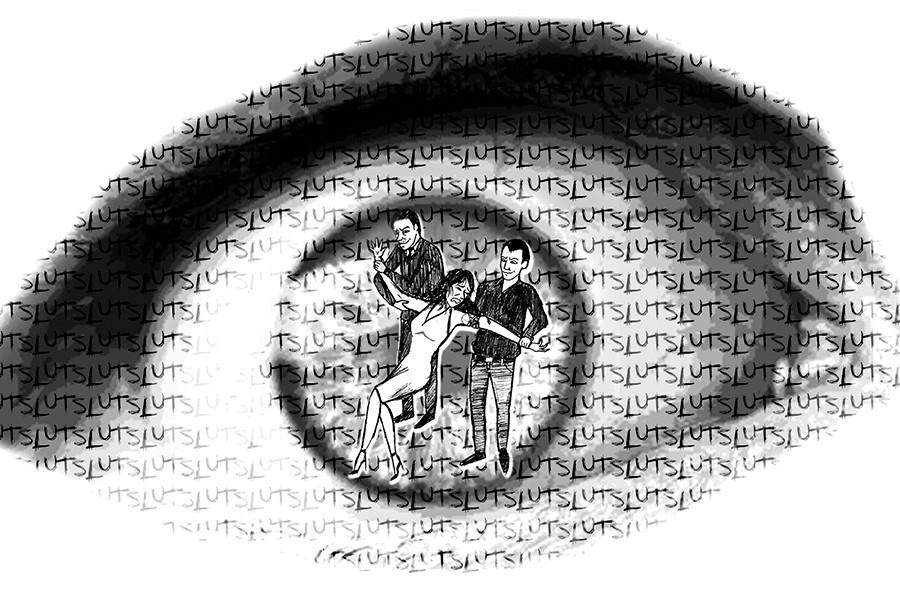Rape culture undermines human rights
Disturbing report reflects cultural biases, lethargy
Feb 4, 2016
The disturbing reality of our society in which nine out of 10 victims of rape are female and one in 33 are male embodies rape culture’s suffocating grasp on female identity.
Although rape is a serious crime and state laws punish rapists, Rape Abuse & Incest National Network (RAINN) also reports that 98 percent of rapists will never spend a day in prison.
Rape culture, a term adopted in the 1970s by feminists, normalizes sexual assault and makes excuses for the perpetrator.
It teaches the victim to avoid rape instead of teaching the rapist that his actions are wrong.
Mainstream media outlets use misogynistic language in song lyrics, rape comedy, rape prevention tools and victim blaming and shaming to support rape culture.
When thinking of how rape occurs, the image of the perpetrator jumping out of the bushes or dark alley and sexually attacking the victim comes to mind. This scenario has been instilled in our minds, but according to RAINN four out of five times the victim knows his or her attacker — and 47 percent of rapes are committed by a friend or acquaintance of the victim.
Rape culture gives women tools to avoid rape by telling them how to dress, act and behave.
Rape culture raises the questions women fear to hear: Did she have too much to drink? Was her dress too short or her top too low? Was she walking alone at night? Was she being too friendly?
While measures are taken into consideration to help women avoid being victims of rape, they are not enough.
Four guys at North Carolina State University created a nail polish called Undercover Colors that changes colors to identify date-rape drugs.
While they said their goal was to “invent technologies that empower women to protect themselves from this heinous crime and quietly pervasive crime,” this only is a temporary solution that distracts from the normalization of rape culture in our society.
According to a Waging Nonviolence People Powered News & Analysis article entitled “Rape, Rape Culture and the Problem of Patriarchy,” by Robert Jensen, professor of journalism at the University of Texas at Austin, males often seek power through sex but also use their power to their advantage.
Rape culture says the victim could have avoided their assault altogether by following rape culture’s “laws” and excuses male violence.
Some of these laws are supported through lyrics, such as the well-known Robin Thicke’s “Blurred Lines.” When Thicke sings, “I know you want it,” he is promoting non-consensual sex.
Thicke sings, “You’re a good girl,” which according to rape victim testimonials are usually the words coming out of the mouth of their perpetrator.
N.W.A’s song, “One Less Bitch,” also promotes misogyny and violence against women when MC Ren wrote, “The bitch tried to ‘gank’ me so I had to kill her.”
And people who downplay the significance of those lyrics are supporting rapists simply because of their economic strength and popularity are supporting rape culture too.
Living in a culture that glorifies male violence through music and action movies while over-sexualizing the female body trivialize sexual harassment, making it the norm and allowing room for victim blaming.
Victim blaming is “putting blame for the occurrence of a traumatizing event on the survivor instead of blaming the perpetrator,” according to Humboldt State University’s Stop Rape & Response & Prevention website.
Rape culture is creating prevention education and support programs for rape victims and teaching the importance of consent on college campuses instead of teaching rapists to not rape.
At the University of Colorado-Colorado Springs, college women were told to “vomit and urinate” as potential ways to repulsing their assailant.
And the popular saying “No Means No” was swapped out for “Yes Means Yes” and adopted by more than 800 colleges and universities to raise the importance of consent.
Instead of creating prevention programs for women, organizations should focus on the root of the issue and educate men who rape is wrong in any circumstance.
According to National Sexual Violence Resource Center, one in five women and one in 16 men are sexually assaulted while in college. But more than 90 percent of campus victims do not report the assault.
According to California rape laws consent often becomes a controversial defense because the argument may require evidence of the victim’s sexual history. Unless the victim is a child or someone “lacking mental capacity,” then it is very difficult to prove rape in court.
Rape culture is not always a man jumping out the bushes of an alley. It is the concept that the victim could prevent their rape if they follow the rules while the perpetrator’s actions are overlooked.
Rape culture, for some, is considered a myth made up by feminists looking to exploit men, but it is thriving as it perpetuates the normalization of sexual assault of women in our society.




Jim Gardner • Feb 12, 2016 at 9:00 am
Thank you, Ms. Amparo, for a well written, informative article. In shedding light on this “culture” (sic) you help in understanding. Some of the music does damage, it would be so easy for musicians to make make positive,supportive statements, they have a lot of power. Again, thank you for writing.
Peace, Jim